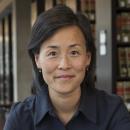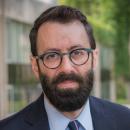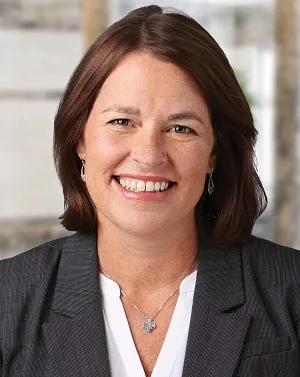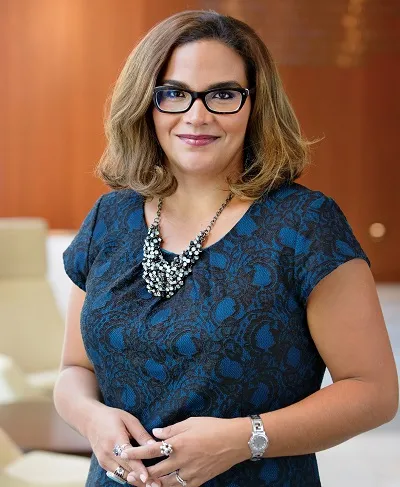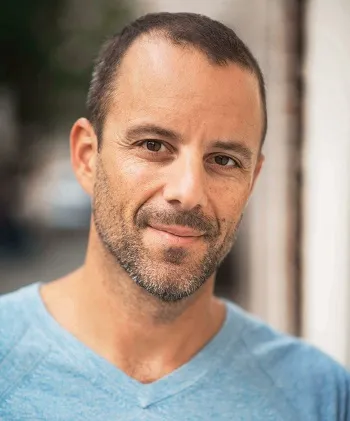New Avenue of Engagement
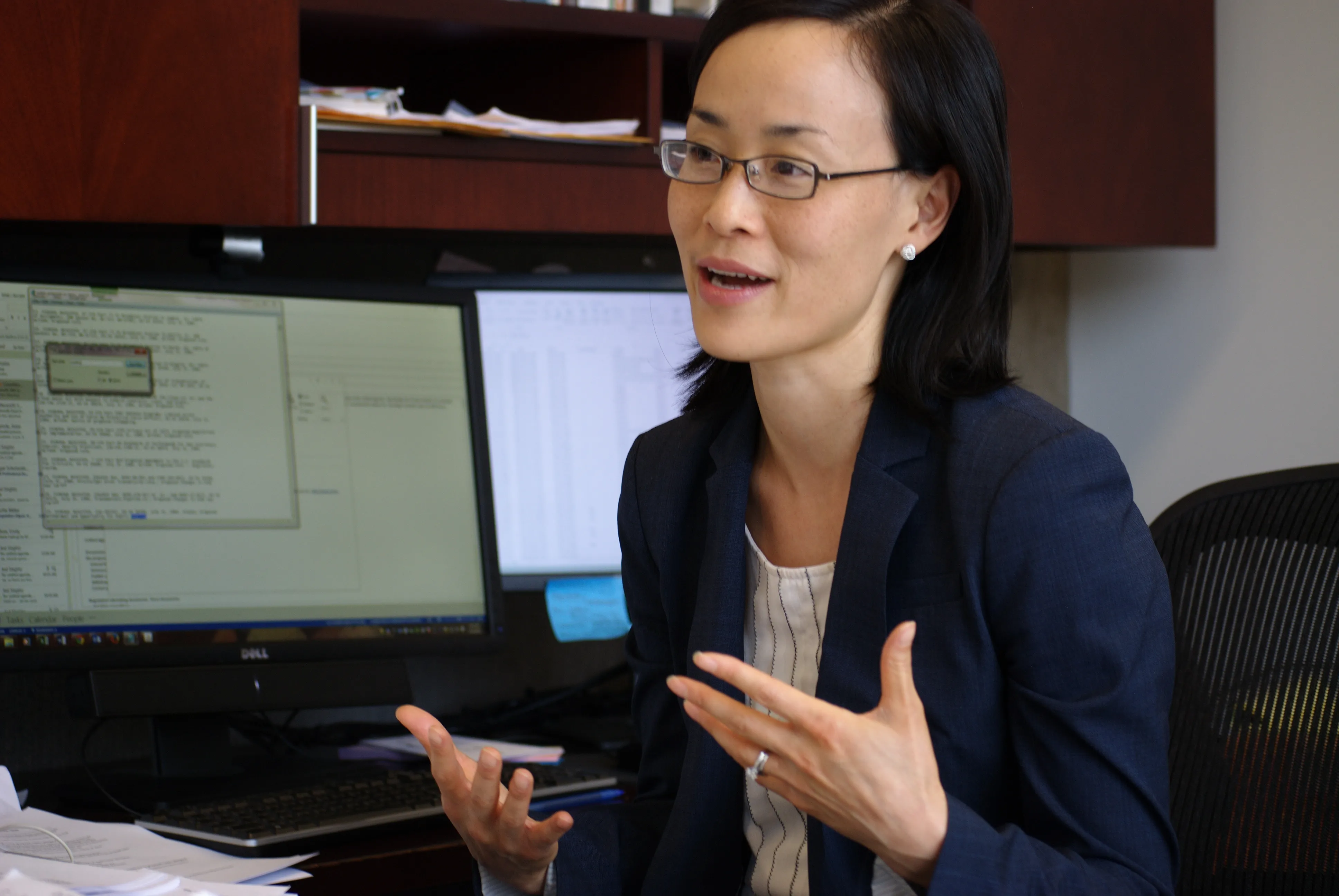
There were a few things Professor William Baude wanted the small group before him to understand before they began discussing his unfinished paper “Arguing with Friends.” And so Baude, a Neubauer Family Assistant Professor of Law, started by recounting a memorable comment he’d gotten three years earlier while presenting a paper during the job talk portion of his Law School employment interview.
“It came from a future colleague, and the question, in its entirety, went like this: ‘I was puzzled by part three of your paper—did you really intend for us to take it seriously?’” Baude said. Then he paused and added: “You probably won’t be surprised to learn that here at the Law School we tend to cut to the chase.”
Chuckles rippled across the room, but there was a point to his tale: the tone and substance of a scholar’s response to feedback, even unsettling feedback, is important. This wasn’t something Baude expected the students around the table to know instinctively. After all, this wasn’t the faculty Works-in-Progress (WIP) lunch, the weekly colloquium in which Law School scholars present draft articles and then invite colleagues to poke, prod, and pry. This was a “miniature WIP,” a gathering designed to pull back the curtain on a side of academia that is often less visible to students, offering them a peek into the process used by faculty to sharpen scholarship and evaluate potential hires.
At the Law School, the WIP is a central part of faculty culture—a distinctive mix of sharp inquisition, devoted collegiality, and unbridled candor that aims to elevate arguments, not egos. Which is why convincing people you are right is rarely the point, Baude told the students. Both WIP talks and job talks are about letting others see how you think and truly listening to the questions and critiques that might strengthen your work.
“It’s the most important, and the hardest, thing for people to understand about this process,” Baude said later. “People are tempted to approach this like an oral argument, where the goal is to duck the hard questions and keep coming back to your strong point. But that’s not the purpose at all. This is about getting a tough question and showing how you think about it and react to it, not necessarily fighting it all the way or accepting it entirely.”
It’s an approach that isn’t always familiar to students, who most often interact with faculty in the classroom, where the Socratic method rules and professors hold the keys to right versus wrong. The Mini WIP, which was developed by Candace Bergeron, now the Assistant Director of Student Affairs, hands students the keys to another avenue of faculty-student engagement. For those considering careers in academia, the Mini WIP can supplement traditional opportunities to explore legal scholarship, such as workshops, student journals, and research assistant positions. And for all students, regardless of career plan, it offers a chance to see how their professors work through complex questions—and to join them, at least briefly, in the exercise.
“One of the things I love about the Law School is that the professors are very accessible—but a lot of the time, you interact with them as teachers, not as scholars,” said Kathrine Gutierrez, ’18, an aspiring academic who attended five Mini WIP sessions beginning with the first, which was given by Professor Anthony Casey in the fall of 2015. “And that’s wonderful, but they have this other role—and most of them are leaders in their fields. It is really interesting and valuable to get some perspective about what they do as scholars, and to see a new side of a topic that they’re an expert in. It really helps round out the experience of law school.”
In addition to Casey and Baude, four other professors presented Mini WIP sessions in the program’s first two seasons. During the 2016–17 academic year, students heard from John Rappaport, Assistant Professor of Law, and Jennifer Nou, a Neubauer Family Assistant Professor of Law. The year before, Alison LaCroix, the Robert Newton Reid Professor of Law, and Genevieve Lakier, Assistant Professor of Law, shared works in progress with students. Together, they showcased a variety of approaches to scholarship, and each of the 65-minute sessions highlighted methods for examining questions that lack easy—or simply lack—answers.
“I’d like to think that this humanizes us, and shows that there are a lot of questions we’re very uncertain about,” said Rappaport, who presented his paper “The Structural Function of the Sixth Amendment Right to Counsel of Choice” at a Mini WIP session in November 2016. “We try to know the answers to the questions we’re teaching in class, but the ones we’re writing about are the ones we often find most challenging. The students get to see that struggle a little bit. I think it’s also helpful for them to see what it is we’re doing when we’re not teaching or preparing to teach.”
The Evolution of Scholarship
A central fascination for several of the students who attended Mini WIP workshops was seeing how professors take broad ideas and gradually shape them into papers containing clear questions and fresh insights.
“It’s nice reading and discussing something in early draft form, and seeing that it isn’t perfect,” Gutierrez said. “They keep working on it and making it better; it doesn’t just spring to life.”
At Casey’s 2015 Mini WIP, for instance, she saw an early draft of his paper “The Death of Rules and Standards,” which later became the basis for his 2017 Coase Lecture.
“It has been really cool to see the paper go through different stages and evolve and become what it is now,” Gutierrez said of the article, which Casey coauthored with Anthony Niblett, a law professor at the University of Toronto who was a Bigelow Fellow with Casey between 2009 and 2011.
That was part of what Jing Jin, ’19, was after when she attended the February 2017 Mini WIP to hear Nou present her then-unfinished paper, “Subdelegating Powers,” which examined the implications of authority delegation within administrative agencies. Jin, who worked in the Environment and Natural Resources Division of the US Department of Justice this summer, wanted to understand how professors frame their inquiries, present existing research, incorporate their own ideas—and, more specifically, how Nou’s findings apply within an agency like the Environmental Protection Agency.
“I got a sense for her process and how carefully she crafted the question. She didn’t just wake up one day and say, ‘This is the research question,’” Jin said.
It was, in fact, a more deliberate process that began after Nou read a news story mentioning that the Federal Communications Commission sometimes delegates subpoena powers to career staff. “I thought, ‘That’s a really important power that’s been entrusted to this relatively low-ranking career staff,’” Nou said. “I began to wonder how often that happens and how much we know about subdelegation.”
She put some time into thinking about the issue and exploring whether the topic had the legs for an academic paper. Once convinced, she reviewed existing scholarship on the delegation of power within administrative agencies and then launched an original study of primary materials, which included filing a Freedom of Information Act request with the EPA to access an internal manual documenting delegations within the agency. After that, Nou began working on a draft, an iterative routine that included writing, additional research, more writing, more research, and many revisions—a process she described to students.
“I enjoyed getting a sense for how she and other professors develop and communicate their ideas,” Jin said. “The way you write something and frame and edit it can influence how effective the article is. You begin with an idea and then build on it to make a more robust theory.”
Bergeron was looking for new, interactive student programming when she attended a faculty WIP two years ago and began thinking about ways to bring a similar experience to students.
“I wanted something that students would gravitate toward, and they’re always asking for more access to faculty, even though their access here is probably greater than at many other schools,” Bergeron said. “I wanted a small, intimate group with a focus on discussion, and I wanted the students to be able to ask the questions that they might not ask in class. I also wanted them to have access to an issue they maybe hadn’t studied before, with a faculty member they maybe didn’t know—and then have the opportunity to give feedback.”
She filled the 12 spots in the first session right away.
The Mini WIP, of course, isn’t the only chance for students to explore scholarship creation, but it does fill a particular niche. Students who work on the University of Chicago Law Review, the University of Chicago Legal Forum, or the Chicago Journal of International Law read and comment on legal scholarship, but they’re rarely in the room with the authors. Those who take a workshop like Public Law and Legal Theory have an opportunity to see faculty, typically from other institutions, present and discuss their scholarship—but Rappaport said the most aggressive questions in those settings tend to come from other scholars. “The students aren’t in the driver’s seat, or they don’t perceive themselves to be,” he said. “We encourage them at the beginning of each year to ask questions, but in my experience they seldom do.”
The Legal Scholarship Workshop, in which students spend a full academic year working on a paper of publishable quality, offers direct experience producing scholarship, and students who work as faculty research assistants often have the chance to talk through tough questions and witness a scholar’s work. But these are different experiences and ones that require a more intense level of commitment.
The Mini WIP is a chance to dip one’s toe in the water, demystifying the process for the less experienced, emphasizing the “in progress” aspect of scholarship, and serving as an interactive model for those who may one day find themselves explaining that, yes, they do hope readers will take part three of their paper seriously—and here’s why.
“I remember when I was a law student it was easy to read these polished papers and wonder: How did anybody ever think of writing something like this?” Baude said. “And at some point you see what the journey really is.”
A Two-Way Street
Perhaps because he’d told the job talk story, and perhaps because several of the students knew Baude well, the questions in the “Arguing with Friends” Mini WIP were particularly pointed and direct.
Baude’s paper, which he coauthored with Ryan Doerfler, a former Bigelow fellow who is now an assistant professor at the University of Pennsylvania Law School, examined peer disagreement among judges, building on and questioning claims made in a 2016 essay by Eric Posner, the Law School’s Kirkland & Ellis Distinguished Service Professor of Law, and Adrian Vermeule, a constitutional law professor at Harvard. (In “The Votes of Other Judges,” Posner and Vermeule argue that judges should consider their colleagues’ views and look upon judicial disagreement as evidence that a statute’s meaning is unclear.)
“This is one reason I went to the Mini WIP—this kind of dynamic has always really interested me, the way that professors are in conversation with each other and constantly sharpening each other’s ideas,” Manuel Valle,’17, said. “This paper took an insight made by other scholars and put a different spin on it, and that’s really fascinating to see.”
He and the other students listened carefully as Baude explained the basics of his paper’s position: judges should most heavily weigh the views of peers who share their methodology or interpretive outlook, a disagreement among those who embrace different ideologies and methods is less surprising and less productive, and judges should sometimes consider the views of nonjudicial epistemic peers as well. When Baude had finished his short overview, the students jumped in with questions: How might the paper’s conclusions apply in other decision-making bodies, such as legislatures? Does a shared methodology always mean two judges will arrive at the same conclusion? What really constitutes an ideological friend? And when Baude called Posner and Vermeule’s work “insightful,” was he trying to be collegial or were there actually ideas that he liked? (It was probably the latter, Baude responded with a laugh, citing a Posner/Vermeule claim he found insightful.)
Several times during the questioning, Baude began his reply with, “Good question, good question,” and each time he appeared to thoughtfully consider the point, engaging in conversation rather than refuting or dismissing the comment. The students’ challenges, he added later, were valuable.
“The level of preparation was really high,” he said. “The students suggested some ways in which one of the core points about judicial disagreement could be explained in a less technical way, they helped me figure out how to make the paper more accessible, and they came up with several counterarguments that nobody had confronted us with yet.”
It’s always nice, he added, “to get feedback from smart people who have read an argument and thought about it carefully and can point out what doesn’t make sense or give suggestions.”
Nou, whose paper was published in the Columbia Law Review in May, said she too made revisions based on the Mini WIP discussion.
“One of the students asked whether the argument I was making in the paper applied to career civil servants versus political appointees,” Nou said. “That was something I’d thought about but hadn’t explicitly addressed as much as I should have in the piece. So I went back and tried to make more explicit how the dynamics would differ between those two groups.”
Jin was struck by this openness and by Nou’s willingness to consider feedback; it was a great lesson in how scholars process other ideas and use them to advance or refine their own thinking.
“Students pressed her on areas, and she would say, ‘Yes, that’s something I was thinking about and that I haven’t fully worked through within the parameters of this research project,’” Jin said. “She acknowledged gaps or places where there were still interesting questions to explore.”
Similarly, Gutierrez said she both enjoyed offering feedback and seeing how faculty responded to their questions and comments. “It’s nice to see how they interact with people who are talking about their work,” said Gutierrez, adding that sessions by Nou, Lakier, and LaCroix gave her a chance to see female faculty in action. “It’s also fun to be able to contribute to something interesting.”
Gabriel Lazarus, ’19, enjoyed seeing the way faculty use both written introductions and spoken introductions to position their research, and he was interested in how they choose their methodology.
“I wanted to see what academic analysis of the law looks like, what tools they use, and if they were the same as the tools they’re teaching us to use,” Lazarus said. “There are so many ways to approach a question, many of them valid. But later, when someone says, ‘Why didn’t you do it this way?’ you will need to accept the feedback and not discount it as useless while also justifying your approach in some way. That balance is new to me.”
This is an important part of the experience, Rappaport said. Some of the students in his session seemed to want to push him to take a more normative approach—a useful discussion, and one that enabled him to explain that not all research needs to take a position. In this case, he said, the purpose was to explore the apparent disconnect between what the US Supreme Court says about the Sixth Amendment’s Assistance of Counsel Clause and what the Court actually does when a party claims that the right to counsel of choice has been violated.
“Students sometimes have difficulty separating different kinds of arguments, in particular descriptive and normative arguments,” Rappaport said. “They are very used to making normative arguments, which is often what we ask them to do in class. For instance, ‘If you were the prosecutor, what would you argue?’ It’s an argument about why this person should or should not be convicted. My paper, however, was avowedly non-normative. It was an attempt to explain a body of law that, on its face, appears not to be terribly coherent. And I think that was interesting for students, and I think some struggled with the fact that I wasn’t trying to take a strong position on what the rules should be. This is a way to expose students to a different type of argumentation that legal scholars use and illustrate why one might choose to develop one or another.”
These intricacies of scholarly thought can be useful training even for those with no plans to enter the academic job market, professors said.
“There are students who will go into BigLaw and will end up on a really high-stakes case where they will need to dig this deep,” Rappaport said, adding that most litigation moves too quickly for one to approach it as a scholar might. “The paper I presented in some ways seems narrow and esoteric, but it is actually exactly the kind of exercise a student might later have to do.”
The law, he added, “is full of contradictions and tensions . . . [There are times] when they will have to make sense of an incoherent doctrine and extract a theory from it. And that’s what I was trying to do in the paper. It’s not something you’re going to have to do in every run-of-the-mill case—but when it counts, you’re going to have to be able to take the law seriously.”

